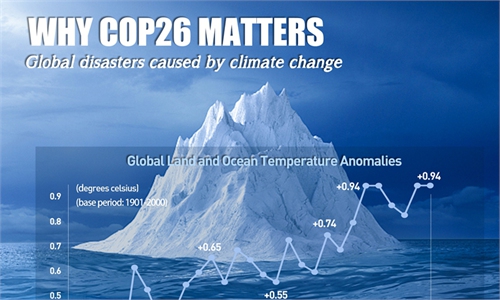
Illustration: Chen Xia/GT
Editor's Note:Starting from Sunday, more than 100 world leaders will gather in Glasgow, Scotland for the latest round of high-level talks, known as COP26, to help address climate change. It comes at a time when many countries are experiencing tight supplies and soaring prices of natural gas and coal. Meanwhile, there have been discussions on the rushed transition to clean energy. Some doubt the reliability of clean energy and whether the current emission polices are too radical. What impact will the global energy crunch have on the COP26 agenda? What goals can be expected at the talks? The Global Times (GT) talked to Research Director of Emerging Risks and Director of the Environment and Society Programme at Chatham House in the UK Tim Benton (Benton), over these issues.
GT: What impact will the recent global energy crunch have on the agenda of COP26? How will it influence the long-term global climate policy?
Benton: There have been different reactions to the current rise in energy prices, some saying this highlights the need for more supply of fossil fuel, others saying that it demonstrates that we haven't gone far and fast enough on the energy transition. However, it is clear that if fossil fuels had a smaller role in the energy mix, then any changes in their prices would have less impact on consumers. Furthermore, if consumers used energy more efficiently, then changes in the cost of their energy would have less of an impact. I therefore think that if gas and oil prices remain high, there will be an acceleration in the transition to the use of electricity for both heating and for transport and there will be increase use of renewable energy to generate this electricity.
GT: What are your expectations for COP26? What goals do you think could be realized?
Benton: It is unlikely that the revised national pledges, in the form of NDCs (Nationally Determined Contributions), will be adequate to meet the temperature targets of the Paris Agreement. Therefore, two things are needed. Further sectoral agreements, such as on the deployment of EVs or Nature Based Solutions, that can help speed up carbon emission reductions, and an agreement on the short term, a couple of years, of when to the review the revised NDCs. As low carbon technologies are deployed and become cheaper, moving away from fossil fuels becomes less expensive and easier. This should enable more rapid carbon mitigation plans.
GT: What responsibilities should developed and developing countries respectively take for global emission reductions? For the industrialized developed countries, what substantive contributions can they make to global emission reduction?
Benton: All national, sub-national (organizations), and the private sector need to take responsibility for their emissions and move as rapidly as practicable to net zero emissions. However, this transition needs to be just and consider the national and local circumstances. It is clear that those countries that have more financial resources available to them have a duty to not only fund their development and deploy new, now carbon, technologies but also give financial assistance to developing and vulnerable countries (which is not being done at the scale necessary).
GT: Analysis suggests that on the eve of COP26, rich countries will continue to miss a longstanding pledge to provide poor countries with $100 billion a year in climate finance for the next four years. If the demand for funding cannot be met, what influence will this have on the global response to climate change and the results of COP26?
Benton: This is a very important issue, and it is hugely problematic that the $100 billion target has not been met by 2020 as pledged. It is now only likely to be met in 2023; and I think that developed countries should make good of their pledge and ensure that post 2024 further funding is available to compensate for shortfall post 2020, so that over a five-year period there is an average of $100 billion per year. Failure to make this pledge has on the ground implications, in terms of the ability to do adaptation and mitigation in large parts of the world, but it also sends a bad political signal as its adoption was a question of trust.
GT: China said earlier that it will not build new coal-fire projects abroad. China has also launched the green Belt and Road Initiative. How do you comment on China's efforts in emission reduction?
Benton: China has made progress domestically and internationally in terms of climate change emissions. As the world's largest financier and exporter of equipment of coal-fired power stations, China's ban will encourage other countries to follow suit and should help accelerate the decline in the use of coal internationally. Furthermore, the announcement of a domestic 2060 carbon neutral target was important. However, it is clear that all countries, including China, and non-state actors, need to do much more to reduce emissions on the short term - before 2030, if the temperature targets of the Paris Agreement are to be met. What happens in China, as the world's largest GHG emitter, matters and therefore on the national and sub-national level mitigation plans to 2025 and 2030 need to be made more ambitious.
GT: Are the existing coal-fired projects enough to support the economic development needs of the developing countries? For developing countries, what is the key to transforming from old energy to new energy?
Benton: The cost of alternative, non-fossil fuel, energy sources and systems has fallen rapidly and they are now cheaper in many/most parts of the world than coal, as has been shown by the International Energy Agency. Therefore, it is no longer a question of if developing countries can afford to undertake the energy transition, but more a question of how do you and how quickly can you change the existing energy system, from an infrastructure and institutional perspective.


